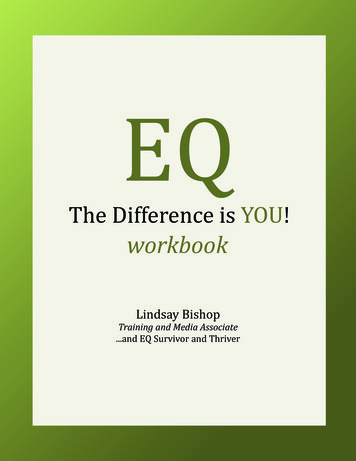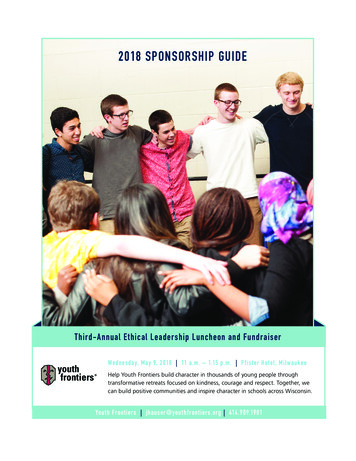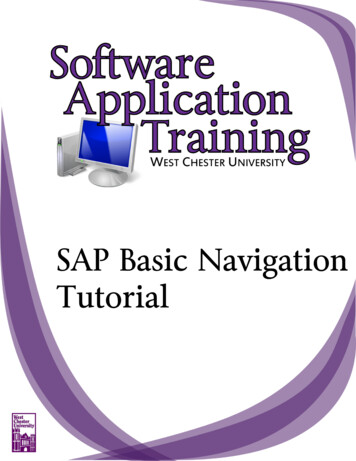
Transcription
EQThe Difference is YOU!workbookLindsay BishopTraining and Media Associate.and EQ Survivor and Thriver
Your Exceptional LeaderThink of someone you know personally whom you would describe as anexceptional leader.Who are they?What makes that person stand out to you?Name an important quality, characteristic, or behavior:Is that exceptional leader quality a.Hard skill: IQ and technical skillsorSoft skill: EQ and transferrable skillsorBoth?Hard SkillsSoft SkillsDegree or Certi icationTechnicalCustomer ServiceOral CommunicationLiteracySoftware KnowledgeComputer Time managementMotivationCreativity2
Select the skills you would like to improve on:Be lexible when faced with change.Help other people express their needs.Solve problems by using both logic and feelings.Calmly and thoughtfully respond to dif icult people.Keep an optimistic and positive outlook.Continuously learn how to improve.OtherWhy did you choose these skills?Recall a time that you had trouble with these skills.What would you like to change in the future?3
Emotional HijackingName a time when your emotions took over your thoughts?What did you do?What emotions came over you?What was the outcome?What could you have done differently to be more emotionally intelligent?4
EQ AttributesCircle the attributes that apply to you. This will allow you to see the areas whereyou excel and the areas in which you have room to grow.LowEmotional IntelligenceHighEmotional DecisiveResistant to PredictableConsistentGood ListenerEasily DistractedGlibSel ishPoor ListenerImpulsiveCriticalPickyFussyHard to t5
Timber ChallengeHow would you have handled the Timber Challenge? Would you have remainedemotionally intelligent?Name a time when something like this happened to you as an employee or as asupervisor. What emotions came over you? What was the outcome?What could you have done differently to remain emotionally intelligent?6
Satir Change ModelRecall a time your organization went through a change .Where were you and your organizationbefore the change?What was the change catalyst that affected you and your organization?How did you and your organization transition through the change?Did you and your organization come out stronger than before?What was your role as a change agent?7
Force ield AnalysisDriving Forces(Positive)Restraining Forces(Negative)Plan for Change8
EmpathyEmpathy: the ability to understand the feelings and perspectives of others anduse that understanding to guide our actions.Name a time when someone did not show empathy toward you.Name a time when someone showed you empathy when you were in a toughsituation.Name a time when you were empathetic.Name a time when you feel you didn’t show enough empathy. What could youhave done to improve your understanding and actions?On a scale of 1-10, how empathetic do you generally feel you are?How do you think others would rate you?What are some actions that you will start, stop, and continue to do in order tobecome more empathetic?9
SELF Pro ileThe SELF Pro ile is an assessment tool designed to revealstyles of interaction that occur within ourselves andthose around us. This assessment will allow you toidentify your unique style of interaction, understand andadapt to other people’s communication styles, predicthow you or others may respond in a given situation andimprove the communication you have with others withdifferent styles. This knowledge will allow you to workbetter with those around you and collaborate, in luence,and develop each other as a team.After the assessment, take a moment to re lect on the following questions:Are you Social, Ef icient, Loyal, Factual, or a combination of interaction styles?What are your strengths and weaknesses?Where do you think you fall in relation to those around you?How can you adapt your interaction style to improve communcation with others?Which behaviors are suitable and which are frowned upon in each style?10
nationalseminarstraining.com/selfquiz/Daniel Goleman’s Website(http://www.danielgoleman.info/)SELF Pro ile Free Online uiz/)ht p:/ Self Improvement/Item/527/index.htmlSELF Pro ile 10 roduct/Category/Self Improvement/Item/527/index.html)Emotional Intelligence - Daniel GolemanPrimal Leadership: Learning to Lead with EmotionalIntelligence - Daniel GolemanEmotional Intelligence Works - Developming “PeopleSmart” Strategies - Michael S. KravitzEmotional Intelligence in Action: Training and Coaching Activities for Leaders, Managers, and Teams Marcia M. HughesThe books listed above are available in our library. If you are interested in borrowing one ormore of these books, please contact Lindsay Bishop at at ex. 0476 or lbishop@wcupa.edu.11
Notes12
Emotional Intelligence Works - Developming "People Smart" Strategies - Michael S. Kravitz Emotional Intelligence in Action: Training and Coach-ing Activities for Leaders, Managers, and Teams - Marcia M. Hughes 11 The books listed above are available in our library. If you are interested in borrowing one or











